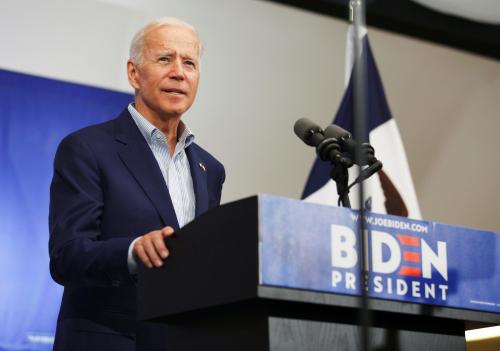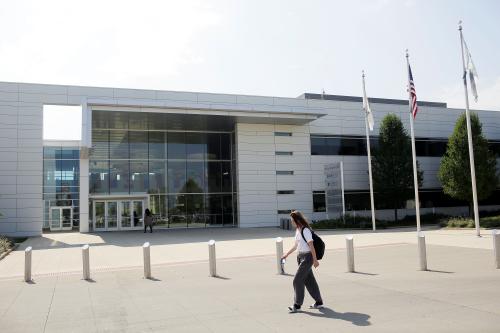This op-ed was originally published by Morning Consult on March 3rd.
Despite a fairly weak showing in Super Tuesday primary elections, Bernie Sanders remains a top contender for the Democratic presidential nomination. Clearly, his populist message resonates with many millions of voters. And even his chief rival, Joe Biden, now regularly beckons “…those who have been knocked down, counted out” to join his campaign.
What is perhaps most surprising is that these populist appeals to workers come at a time when we enjoy the strongest labor market of the last twenty years. Unemployment is very low; and wages are finally growing, by a bit over 1 percent a year after inflation. In addition, workers are trickling back into the workforce; the labor force participation rate is rising, despite many Baby Boomer retirements.
We suspect that much of Sanders’ success, and Biden’s recent adoption of a more populist tone, are based on a simple fact: for many, the recent good news just can’t outweigh forty years of fairly stagnant wages. And yawning gaps in earnings remain between 4-year college graduates and the very large majority of workers without them.
For those without college diplomas, automation and globalization have already eliminated millions of good-paying jobs, and promise to do more of the same in the coming decades. Too few Americans without BAs get the kinds of skills and credentials that the labor market rewards, and employers invest too little in the education and training programs that provide them. At a time when skills are the primary ticket to the middle class for American workers, state subsidies for public universities are declining, as is federal funding for the workforce system. And skills acquired by workers on the job are often neither recognized nor rewarded with career-enhancing opportunities.
The laws and institutions that protect workers and strengthen their hand in dealing with employers have also weakened. Federal minimum wage and overtime statutes are badly out of date; and unions decline in strength each year, further weakening the bargaining power that could force employers to raise their pay.
At the same time, employers face less competition from one another than in the past, further cementing the imbalances in market power that enable them to treat workers poorly. Profits and executive compensation are very high. Meanwhile, automation and outsourcing provide employers with many options for skimping on pay raises and avoiding high-wage workers. Only the tight job market now limits their strength, and it won’t last forever.
And too many workers without college degrees have left the labor force altogether. Despite their recent trickle back into the workforce, millions remain on the sidelines – including those with criminal records and opioid dependencies, as well as parents of newborns or sick children and elderly parents.
Unfortunately, Sanders’ most often repeated solutions – like Medicare for All and free college – would be hugely expensive but do little to address the underlying causes of wage stagnation and inequality. And, while billionaires should pay higher taxes, they alone cannot fund the policies needed to raise wages and reduce inequality.
Rather than simple slogans, we need a multi-pronged effort to raise wages and help workers who now lack college diplomas. We should start by raising our funding for public universities, and also for the community colleges that provide the training that employers value. We must also invest in and modernize our labor force statistics, to better guide education and training options of workers and firms.
Workers need more “voice” and protections in the workplace – through unions or work councils. The federal minimum wage and overtime rules need updating, and should perhaps be applied to some workers in nontraditional jobs. Vigorous antitrust enforcement should limit the ability of employers to eliminate competition through mergers.
Parents of newborns and other caregivers need paid family leave. Lower income workers and their children need high-quality subsidized childcare. Those with opioid addictions need treatment rather than jail sentences. And those with criminal records need help reentering the workforce, even as we lock up fewer people in the first place for nonviolent offenses or lack of bail money.
Enacting this ambitious agenda will be impossible without political reforms as well. The reigning anti-tax stranglehold of the federal government must end. So too should rising voter ID requirements that suppress votes among younger, non-college, and minority citizens, and unlimited flows of campaign dollars from the wealthy.
Bernie Sanders has shown an important ability to energize younger voters and non-college workers, while Joe Biden appeals somewhat more to older and suburban voters. As the election year continues, we hope that all of the remaining Democratic candidates clearly acknowledge the frustrations of non-college workers caused by decades of stagnant wages and rising inequality. And then we urge them all to embrace the sensible and practical pro-worker agenda that we outline above.
The Brookings Institution is committed to quality, independence, and impact.
We are supported by a diverse array of funders. In line with our values and policies, each Brookings publication represents the sole views of its author(s).








Commentary
Op-edBernie’s populism – and what it says about the job market
March 4, 2020